
US President Joe Biden wasn’t the only person to experience the Ford F-150 Lightning electric truck firsthand this week.
On Friday we got our first in-person look at the Ford F-150 Lightning full-sized electric truck, and it was something pretty special. This is the US’s best-selling vehicle of any kind, but electrified and better in almost every way.
While we can’t yet comment on the experience of the drive, we can comment on the specs, which are pretty spectacular. Read on about the most torque ever in an F-150, 300 miles of range, home/worksite power, and why the “lightning” moniker isn’t just about electricity, it’s about supercar quickness.
From the Ford executives in case my superlatives weren’t enough:
“For both Ford and the American auto industry, F-150 Lightning represents a defining moment as we progress toward a zero-emissions, digitally connected future,” said Bill Ford, executive chair, Ford Motor Company. “F-Series is America’s best-selling truck for 44 years, the backbone of work across the country, and a trusted icon for generations of customers. Now we are revolutionizing it for a new generation.
“The F-150 Lightning is a massive moment for our Ford team. America’s No. 1 auto brand is going zero emissions with America’s favorite vehicle. It’s quicker than a Raptor, with standard 4×4 and independent rear suspension; a power frunk, enough juice to run your house for three days or power an awesome tailgate; and it will forever improve with over-the-air updates,” said Ford President and CEO Jim Farley. “It will be built at the Rouge factory, where Henry Ford changed the world and my grandfather punched in every day. F-150 Lightning represents all that our country can do when we push for progress.”
Suffice to say that this is a big deal. So let’s break it down line item by line item.
Battery/range
Ford will have two separate liquid-cooled batteries, the 230-mile standard and the 300-mile extended range. Optional premium packages (read: big tires) will reduce that range, however. Obviously as EV drivers, we know towing, terrain, weather, and payloads will also significantly impact range.
While an official coefficient of drag was not available, Ford did note that it was the most drag efficient full-sized Ford truck ever, due in no small part to the flat grill and underbody.
Price (are you sitting down?)
$39,974 is the starting price for the standard range both for fleet owners and consumers. That’s before incentives, which could push the price down near $30,000 depending on federal ($7,500) and state incentives (up to $5,000). Ford said analysts expected a starting price of $20,000 higher and frankly so did I. So this seems like a great deal.
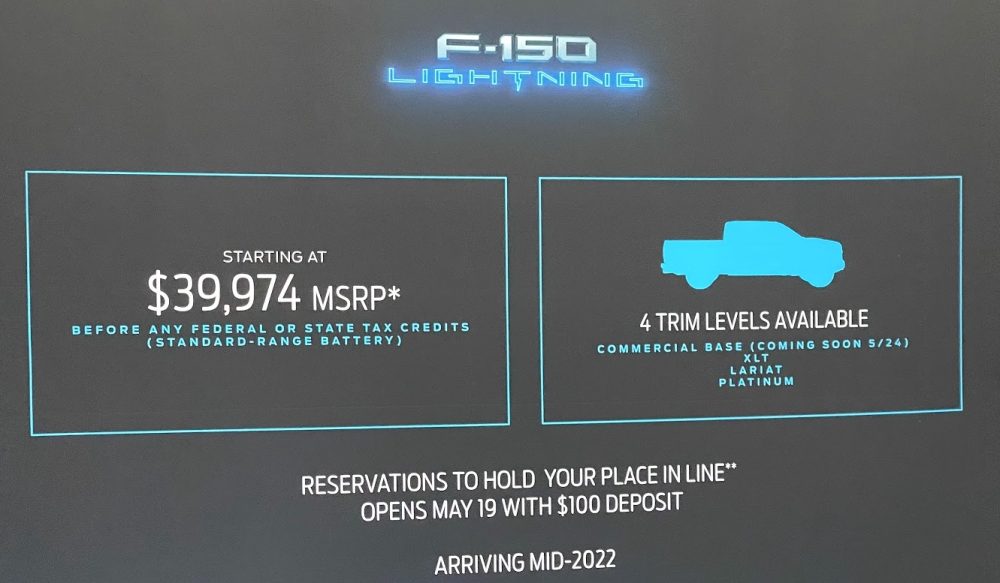
The extended range will be just $10,000 more for fleet owners and we’d assume something similar for consumers, though Ford hasn’t specified exactly. There are four trims and tons of options that could make the price increase significantly. We’ll not wade into the details, you can check the spec sheet for that.
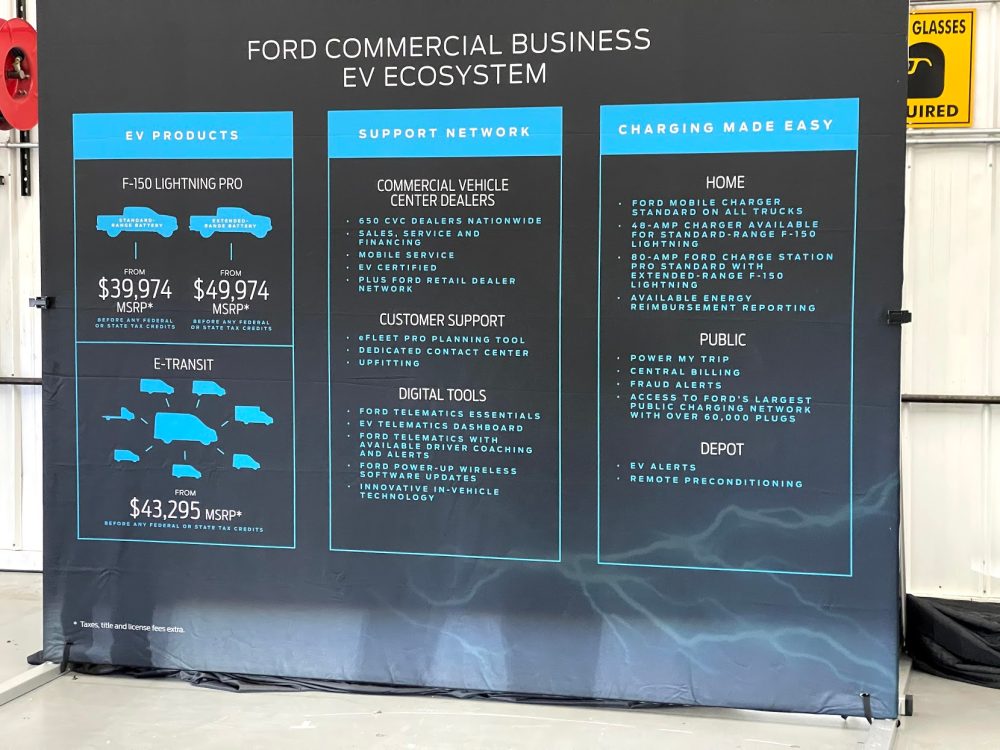
The demo models we got to ride in were pretty premium trim models and felt like huge luxury vehicles inside. I imagine those will tip into $60,000 or higher. That said, many of Ford’s current F-150 ICE models trim out at $60,000 and above so there are many buyers in this pricerange.
To compare, Tesla’s Cybertruck pricing and release dates (which are often non-binding):

Power/torque
All Lightning models will be AWD with the power split between the front and rear motors. The power breakdown between the two wasn’t provided, but they are optimized for speed, power, and efficiency.
The high-end extended model will come outfitted with 420 kW/563 horsepower and 775 lb-ft. of torque – the most torque of any F-150 ever. Not shocking at all for an electric vehicle if you’ve driven a Tesla or other sport EV. That 562 horsepower will also get the extended range F-150 Lightning from 0 to 60 miles per hour in mid-4-second range…Or faster, if my neck aches are any indication. Four seconds is fast for a car, and insane for a full-sized pickup truck.
The standard range motors will pull 318 kW/426 horsepower which is still impressive.
Charging
At home, Ford will offer a monster 80A (19.2 kW) Charge Station Pro charger standard for its extended-range 300-mile truck plus a 32A Mobile charger that will also be standard for its 230-mile vehicle. An optional 48A charger is also offered. That adds an average range of 30 miles per charging hour, fully charging an extended-range truck from 15% to 100% in about eight hours. Most new homes in the US have 150-200A service which should have plenty of room for a charger of this magnitude, but some older homes might need to upgrade to be able to add 80A to the breaker box.
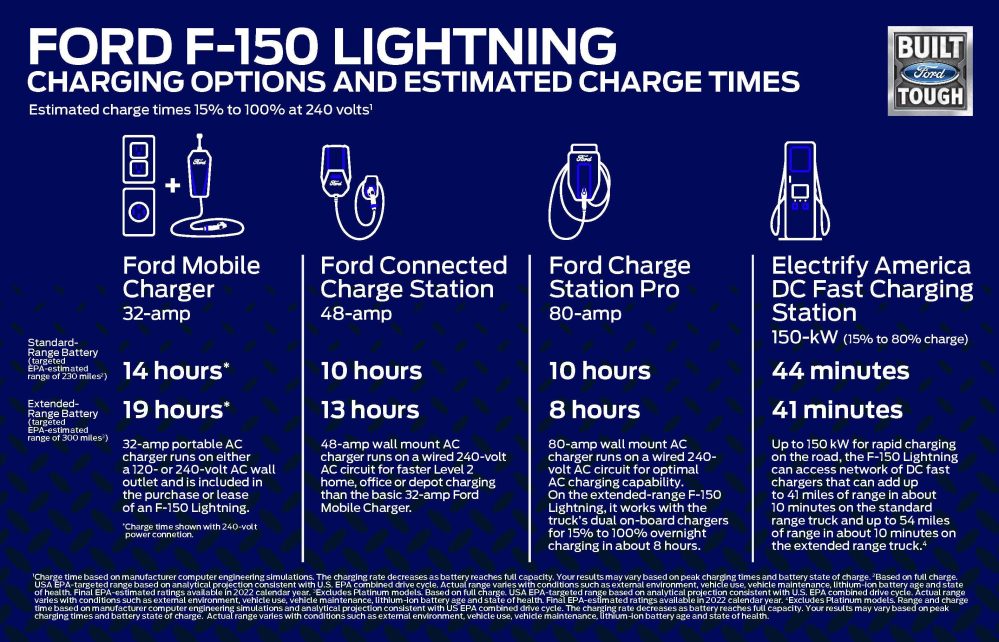
On the road, Lightning customers will have relatively seamless access to North America’s largest public charging network through FordPass, with more than 63,000 charging plugs and growing across the US. That includes both level 2 and level 3 chargers, however, most users will want to find 150 kW chargers that are relatively few but growing in number.
On a 150-kW DC fast charger, extended-range F-150 Lightning is targeted to get up to 54 miles of range in 10 minutes and charge from 15% to 80% in about 41 minutes. No official word yet on whether Ford will be able to update this speed but that’s not going to be an upgrade from gas speeds on trips.
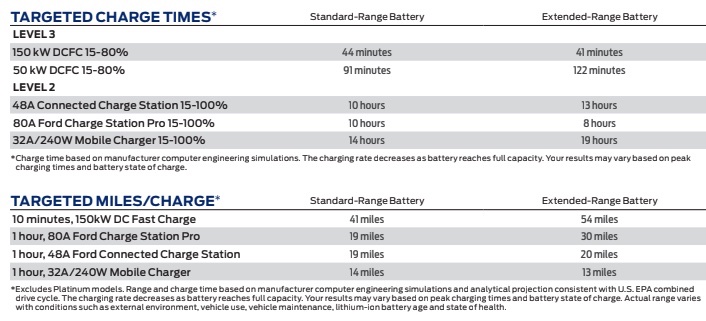
Ford also understands Plug and Charge standard, and it will work on the F-150 Lightning, just like the Mustang Mach-E. That means no swiping credit cards, phone apps, or anything else. Pull up to an EA or Plug and Charge station, plug in, and you’re charging.
F-150 Lightning battery size
Official size wasn’t provided, but back-of-napkin math from above:
19.2kW * 8h = > 150kWh which is 85% of 170kWh - 180kWh
That’s roughly double the size of the Mustang Mach-E long-range pack. Similarly, we can estimate the size of the smaller pack to be about 77% range, or somewhere near 138kWh.
We know these packs are coming from SK Innovation out of Korea, whereas the Mustang Mach-E packs came from LG.
Towing/payload
F-150 Lightning targets a maximum 2,000 pounds of payload in the standard-range model with 18-inch wheels, and a maximum 10,000 pounds of available towing capacity on XLT and Lariat trucks with the extended-range battery and “Max Trailer Tow” Package. The low center of gravity brings even more confident handling, whether traveling along rain-slicked roads or through sand.
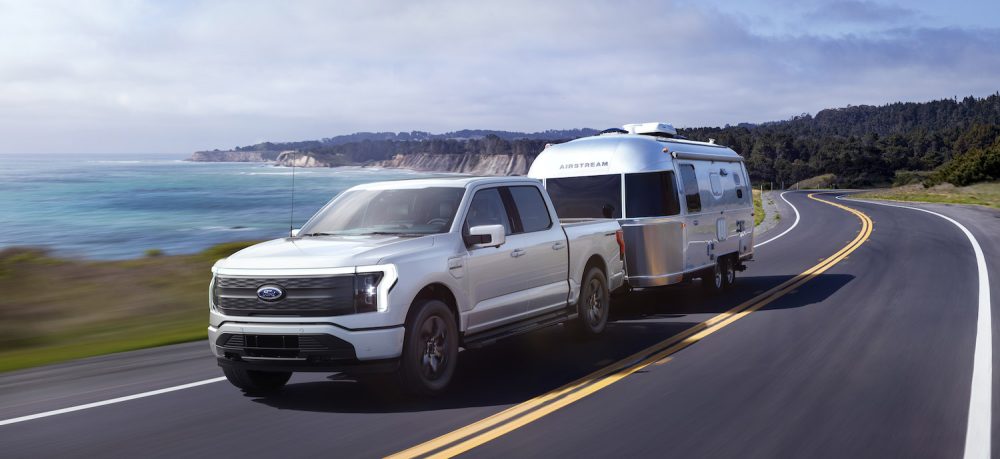
Also, the F-150 Lightning debuts available Pro Trailer Hitch Assist, which automatically controls steering, throttle, and brake inputs to make you forget you have a hitched trailer.
The cassis of the Lightning is similar to a regular F-150 but reinforced with extra strength to account for the battery’s extra weight. Unlike some other EV’s Ford kept the spare tire in the back.
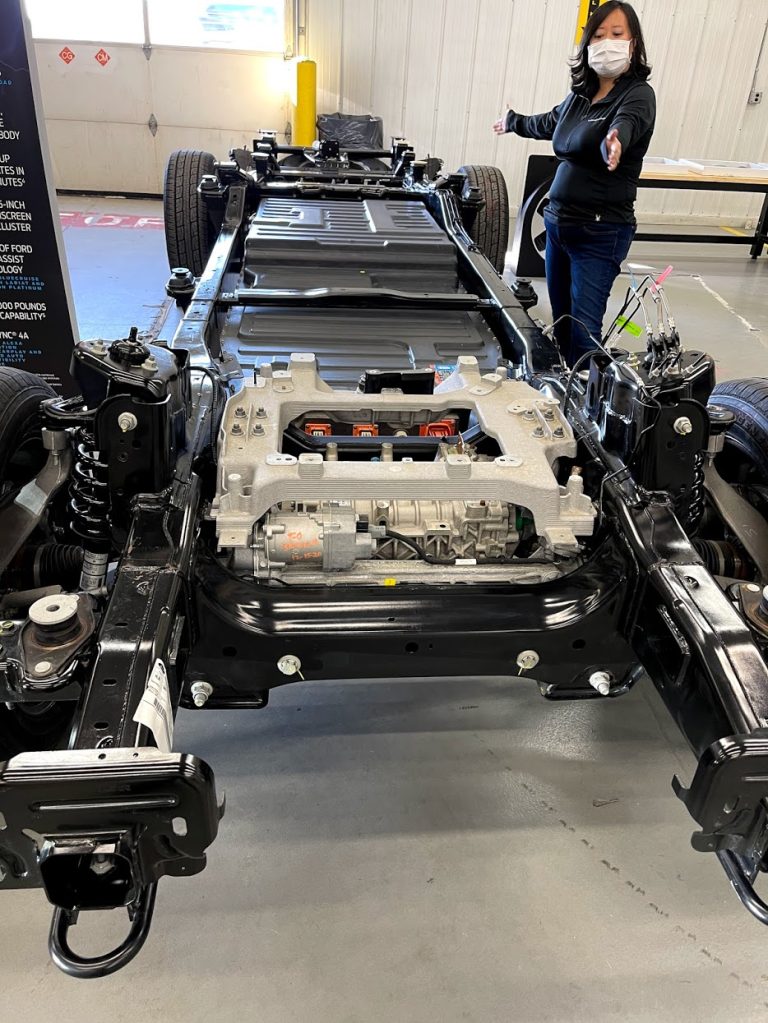
Interestingly, the standard range battery model can carry more than the extended (offsetting the smaller battery weight by 200 lbs) at 2,000 lbs vs. 1,800 lbs. As for towing, a standard range is rated for 7,700 lbs and the Extended can haul a whopping 10,000 lbs.

OTA updates, app, BlueCruise, and general technology
Ford was a little vague here, noting only that “F-150 Lightning offers an ingenious array of connected, intelligent features that improve over time via over-the-air software updates; FordPass app provides seamless access to charging stations and remote vehicle controls; available BlueCruise offers true hands-free driving on the highway, while enhanced Pro Power Onboard powers job sites or campsites.”
One thing that stood out to me is the ability to weight the payload both from the dash and from the app. From there, Ford takes that into consideration when figuring out range. Smart.
I haven’t been able to test Ford’s Bluecruise or 360 autopilot system yet but hope to in the near future. The Mustang Mach-E’s system wasn’t ready for primetime.
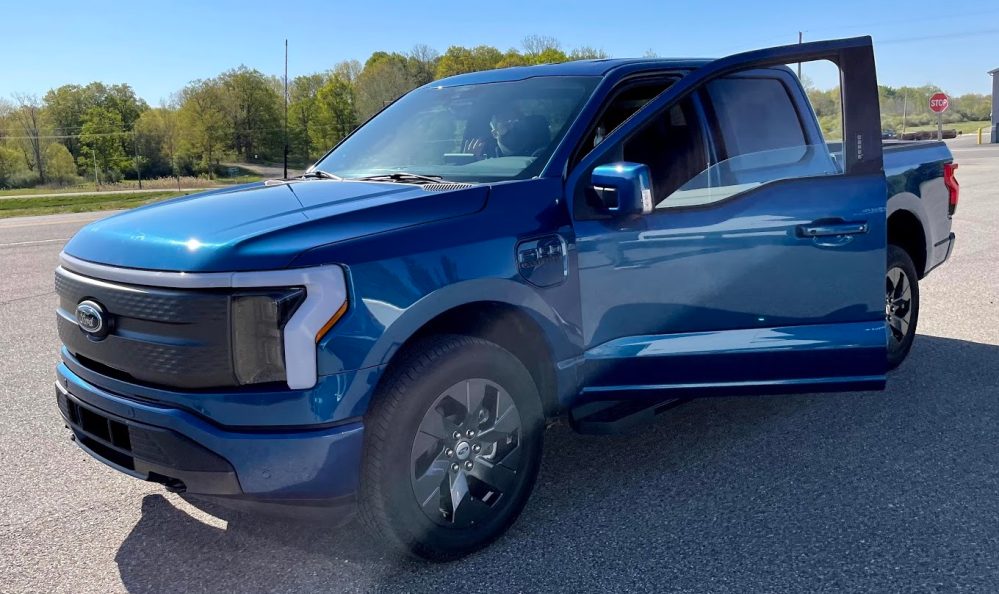
Power at home: the game changer
The promise of using the electric vehicle battery to power the home has always seemed so close yet so far. We know that Tesla Powerwalls are fantastic ways to run backup power or save electricity costs by charging when energy is cheap and discharging when expensive. But no one, including Tesla, has made linking the car to the home easy… until now.
Debuting on F-150 Lightning is Ford’s “Intelligent Backup Power,” turning the Lightning into the ultimate power source for the home. With the ability to offload 9.6 kilowatts(!!) of power, Ford Intelligent Backup Power keeps the lights on during an outage while providing security by powering home appliances, security systems, and more.
You don’t have to create a separate panel for the HVAC, refrigerator and essentials. It powers your whole damn house from your main panel –as long as you don’t exceed 9.6kW.
This is all done through the charging cable and a home gateway from a partnership with solar provider Sun Run, so there isn’t anything extra to plug in or switches to flip. The power switching is also seamless and can switch between home and islanding in a fraction of a second.
Holy frunk!
Ford has made very likely the biggest front trunk on any production vehicle ever made.The F-150 Lightning has enough internal storage in the front to rival SUV rear cargo space. Like the Mustang Mach-E, there is a drain, and this one is waterproof to keep the inside dry.
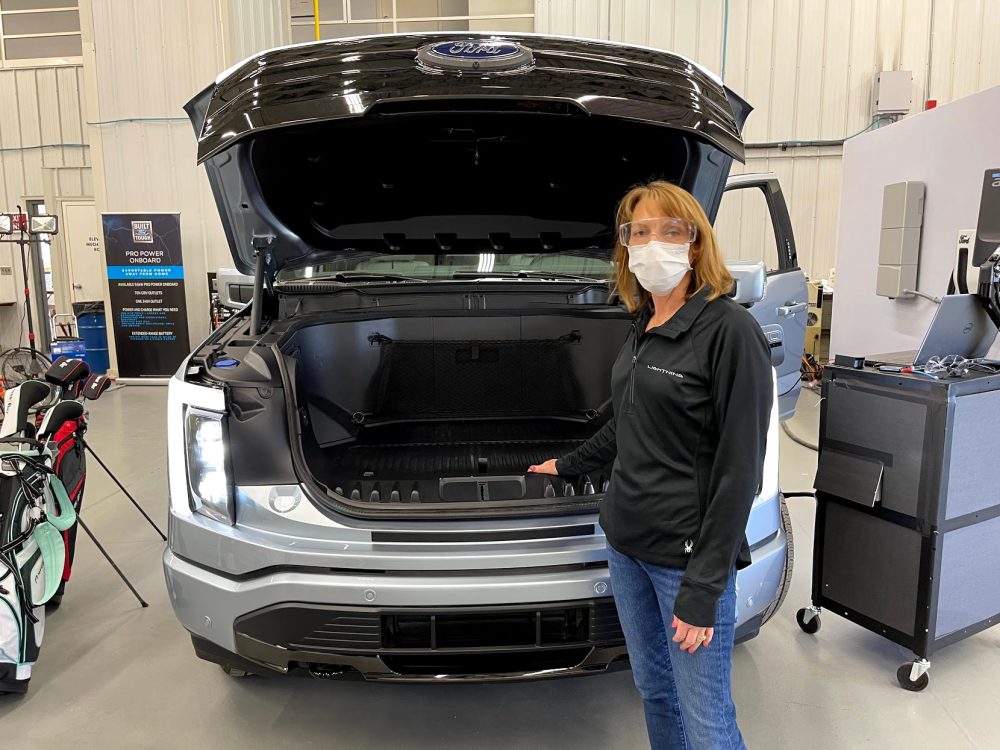
All told, there are 14.1 cubic feet (400 liters). Add 52.8 cubic feet of the cargo box in the back, and there isn’t much you can’t carry.
When can you buy the Ford F-150 Lightning?
First deliveries will take place in spring 2022. F-150 Lightning will be available in four series and two battery options at more than 2,300 EV-certified Ford dealers across the country.
Also for fleet customers, access Ford’s complete ecosystem of connected data and telematics services via
Ford Commercial Solutions.
Reservations can be made with a $100 deposit, notable the same as a Tesla Cybertruck and 1/10th the cost of the Rivian R1T.
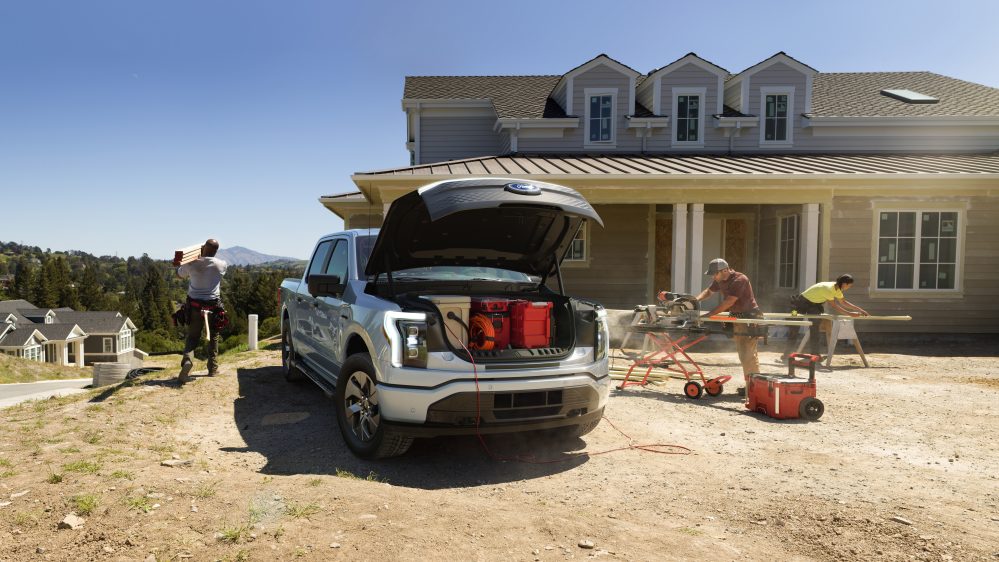
Electrek’s Take
Wow! Just wow.
I’ve had the better part of a week to digest all of this and it still rocks my world.
I’ve never wanted to own a truck in my life, including when I actually owned a truck, and I’m having that discussion about the F-150 Lightning with my wife right now.
Taking a step back. The look of the vehicle is what I expected. The battery size and range is what I’d hoped for, but Ford really did some amazing job with the rest of the product.
The 9.6 kW house/worksite charging thing is a huge bonus. It’s something I wish Tesla and other EV makers would get on board with. Maybe they will have to now? It seems like it’s Tesla’s game to lose, but here we are.
The speed is absurd…like greased *Lightning*. Ford quoted us a mid-4 second 0-60, but my Model 3 does that and this was certainly faster, at least 0-30. But it was quite quick all the way up to 100 mph.
Offroading is amazing. With significant ground clearance and a low center of gravity, it shoots through the mud and over significant obstacles. I might be one of only a few people to have ridden in both the Cybertruck and the Ford F-150 Lightning, and I can tell you that acceleration-wise, they are very close.
The frunk is over-the-top huge. Two humans can fit in here in case there is still a drive-in movie theater nearby. It has 2.4 kW of AC power inside so it could become a refrigeration unit for groceries or tailgating. There’s also has a ton of organizational niceties that shows Ford has really been thinking about this.
It isn’t all gravy however. I think the 150 kW charging speed is too slow for this application and should be about double. You are talking 45 minutes to an hour per stop on the highway vs. 20-30 minutes. That’s a huge difference and something that will need to be addressed.
Overall, what this shows is that Ford saw Rivian’s R1T and Tesla’s Cybertruck coming and decided they weren’t going to give up the pickup crown to upstart EV makers so easily. Ford is deadly serious about playing in the EV world, and if the Mustang Mach-E didn’t prove that Ford is serious about electrification, you can’t ignore the Lightning.
Subscribe to Electrek on YouTube for exclusive videos and subscribe to the podcast.
Author: Seth Weintraub
Source: Electrek



